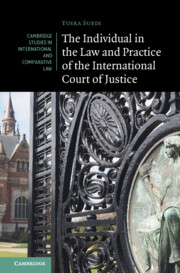Book contents
- The Individual in the Law and Practice of the International Court of Justice
- Cambridge Studies in International and Comparative Law: 192
- The Individual in the Law and Practice of the International Court of Justice
- Copyright page
- Contents
- Foreword
- Acknowledgements
- Table of Cases
- Introduction
- Part I The Individual in the Law of the International Court of Justice
- Part II The Individual in the Practice of the International Court of Justice
- 6 Maritime Disputes
- 7 Territorial Disputes
- 8 Environmental Disputes
- 9 Sources
- 10 Remarks on Practice
- 11 Final Thoughts
- Bibliography
- Index
- Cambridge Studies in International and Comparative Law
9 - Sources
from Part II - The Individual in the Practice of the International Court of Justice
Published online by Cambridge University Press: 25 March 2025
- The Individual in the Law and Practice of the International Court of Justice
- Cambridge Studies in International and Comparative Law: 192
- The Individual in the Law and Practice of the International Court of Justice
- Copyright page
- Contents
- Foreword
- Acknowledgements
- Table of Cases
- Introduction
- Part I The Individual in the Law of the International Court of Justice
- Part II The Individual in the Practice of the International Court of Justice
- 6 Maritime Disputes
- 7 Territorial Disputes
- 8 Environmental Disputes
- 9 Sources
- 10 Remarks on Practice
- 11 Final Thoughts
- Bibliography
- Index
- Cambridge Studies in International and Comparative Law
Summary
This chapter observes instances in which the World Court has recognised that certain sources of international law may confer rights for individuals. It first identifies cases where the Court has interpreted relevant provisions of other international treaties, beyond the international human rights framework, as conferring rights on individual. In so doing, it analyses where the Court has applied ‘textualist’ and ‘intentionalist’ approaches to reach its conclusions. The chapter then notes where the Court has identified customary international law, the existence of which would confer rights to private persons in specific contexts. It notes that while there are ambiguities in the Court’s methods, this is characteristic of its approach to sources more broadly
Keywords
- Type
- Chapter
- Information
- Publisher: Cambridge University PressPrint publication year: 2025

